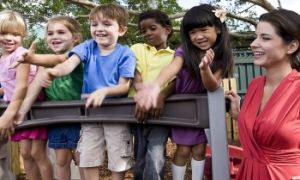

For Educators, one of the hardest tasks is getting children to listen. It may be easier for some but for others (especially Educators who are casual) it can be difficult to get the children to pay attention and to listen to your instructions.
When you've have accepted a job offer in service, it is fairly common that you will be put on a probation period. This is used to asses if you are suitable for the position and you meet the standards and expectation of your job responsibilities.
When writing a report on a child, it's an opportunity for the Educator to capture the child's learning and for parents to receive an account of their child's engagements within an early childhood setting. The following article provides information on examples of writing prompts and comments that can be used when writing yearly reports on the child.
As we come towards the end of the year, it's time to get ready to store the documents and records that have been made throughout the year, such as incident, injury, illness records, documentation relating to a child etc.. The National Regulations provides details on how long records and documents need to be stored and kept.
Spatial skills refer to the ability to see a two or three-dimensional objects or think in a way that relates to space and the position, area and size within it.
A new study from Macquarie University has found that Educators talk less to babies and toddlers ranging from 50 words per minute while some Educators only use 10 words per minute.
Learning Styles is simply how a child can learn successfully. The ability of how a child concentrates and stores or remembers new information is their learning style.
As an Educator, it's important to assess and document children's learning. This refers to gathering and analysing information about what children know, can do and understand. It is part of a cycle that includes planning, documenting and evaluating children’s learning.
It is now mandatory for Educators in Victoria to report suspicions of sexual abuse as part of Victoria's government's response to the child sex abuse royal commision.
As Educators working with children, it's important to understand each theoretical approach and use parts of different theorists in context. Each theorist’s ideas are independent of the other, but when put together, they give us a good overall understanding of how children develop as they age. The following is an overview of popular child theorists, a brief description of their theories and how to implement their theories into practice within the early childhood environment.
 Here is the list of the EYLF Learning Outcomes that you can use as a guide or reference for your documentation and planning. The EYLF… Read More
Here is the list of the EYLF Learning Outcomes that you can use as a guide or reference for your documentation and planning. The EYLF… Read More
 The EYLF is a guide which consists of Principles, Practices and 5 main Learning Outcomes along with each of their sub outcomes, based on identity,… Read More
The EYLF is a guide which consists of Principles, Practices and 5 main Learning Outcomes along with each of their sub outcomes, based on identity,… Read More
 This is a guide on How to Write a Learning Story. It provides information on What Is A Learning Story, Writing A Learning Story, Sample… Read More
This is a guide on How to Write a Learning Story. It provides information on What Is A Learning Story, Writing A Learning Story, Sample… Read More
 One of the most important types of documentation methods that educators needs to be familiar with are “observations”. Observations are crucial for all early childhood… Read More
One of the most important types of documentation methods that educators needs to be familiar with are “observations”. Observations are crucial for all early childhood… Read More
 To support children achieve learning outcomes from the EYLF Framework, the following list gives educators examples of how to promote children's learning in each individual… Read More
To support children achieve learning outcomes from the EYLF Framework, the following list gives educators examples of how to promote children's learning in each individual… Read More
 Reflective practice is learning from everyday situations and issues and concerns that arise which form part of our daily routine while working in an early… Read More
Reflective practice is learning from everyday situations and issues and concerns that arise which form part of our daily routine while working in an early… Read More
 Within Australia, Programming and Planning is reflected and supported by the Early Years Learning Framework. Educators within early childhood settings, use the EYLF to guide… Read More
Within Australia, Programming and Planning is reflected and supported by the Early Years Learning Framework. Educators within early childhood settings, use the EYLF to guide… Read More
 When observing children, it's important that we use a range of different observation methods from running records, learning stories to photographs and work samples. Using… Read More
When observing children, it's important that we use a range of different observation methods from running records, learning stories to photographs and work samples. Using… Read More
 This is a guide for educators on what to observe under each sub learning outcome from the EYLF Framework, when a child is engaged in… Read More
This is a guide for educators on what to observe under each sub learning outcome from the EYLF Framework, when a child is engaged in… Read More
 The Early Years Learning Framework describes the curriculum as “all the interactions, experiences, activities, routines and events, planned and unplanned, that occur in an environment… Read More
The Early Years Learning Framework describes the curriculum as “all the interactions, experiences, activities, routines and events, planned and unplanned, that occur in an environment… Read More

Workers' compensation in early childhood settings in Australia is crucial for ensuring the safety and...
See more...
Under regulation 126 of the National Regulations, qualification requirements for educators at a centre-based service...
See more...
Workplace bullying is a serious issue that can have significant impacts on an individual's mental...
See more...© 2009-2025 Aussie Childcare Network Pty Ltd. All Rights Reserved.

